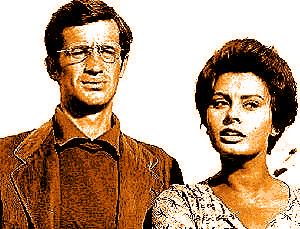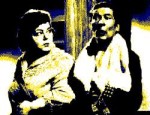Film Review

Made at a time when the sexual revolution was rapidly gathering momentum, bringing with it an increasing focus on women's rights and the role of women in society, La Ciociara has an obvious feminist slant to it, which may go some way to explaining its enormous popularity. Based on a well-known novel by Alberto Moravia, the film depicts an Italian widow's attempts to shield her 13-year-old daughter from the atrocities of war. Superbly portrayed by Sophia Loren with an uncommon mix of toughness and compassion, the film's heroine Cesira represents the ideal of motherhood, a woman who lives only to protect her child. When, in the film's most shocking scene, her daughter is raped alongside her by Moroccan soldiers (in a Church of all places), we feel not only the horror of the most brutal of crimes but also the terrible desolation of a mother who has failed to keep her child out of harm's way. It is not the rape that burns itself into our consciousness, but Cesira 's reaction to it upon realising that the one thing that matters to her has been taken from her and utterly desecrated.
It was De Sica's earlier film L'Oro di Napoli (1954) that had given Sophia Loren her first big break, leading to a contract with Paramount which made her an international star. For La Ciociara, Loren was originally offered the part of the daughter but she insisted on playing the far more challenging role of the mother, even though she was just 25 year old at the time. Under De Sica's guiding hand, Loren gives a performance unlike any other she had previously given, the most devastating portrayal of a mother who tries and fails to protect her daughter from the evils that pervade the world. Loren's achievement was amply rewarded with a brace of Best Actress awards, including the award at Cannes in 1961 and an Oscar the following year (the first time the Best Actress prize had been given for a performance in a foreign language film). When Sophia Loren was invited to reprise the part of Cesira in Dino Risi's television remake in 1989, she accepted willingly - it is hard to think of another film role in which she appears to invest so much of herself and conveys such an intensity of feeling.
Jean-Paul Belmondo also benefited from the success of La Ciociara (particularly in France, where it attracted an audience of 2 million). After his success in Jean-Luc Godard's À bout de souffle (1959), the actor was struggling to hold on to his easily won stardom, and his first foray into Italian cinema - Alberto Lattuada's Lettere di una novizia (1960) - had been something of a disaster. La Ciociara provided a badly need shot in the arm for Belmondo's career and led to more high profiles roles, in Mauro Bolognini's La Viaccia (1961) and Jean-Pierre Melville's Léon Morin, prêtre (1961). The part of the intellectual idealist, a free-spirited individual with a romantic temperament, could not have suited Belmondo better and, in hindsight, it appears to have had an important part in the creation of his likeable screen persona - that eternally juvenile Don Quixote-type who lives for the moment, as fully and as truthfully as any human being can. La Ciociara was Sophia Loren's film, and it was right that Loren should steal the lion's share of the acclaim it garnered, but it was also a highly significant film for her co-star, who was soon to become one of the biggest names in French cinema.
© James Travers 2013
The above content is owned by frenchfilms.org and must not be copied.
Film Synopsis
In the summer of 1943, Rome is under constant bombardment. A young widow named Cesira flees the capital with her 13-year-old daughter, Rosetta, and returns to her home village in the mountainous Ciociaria region of Italy. In her absence, she asks her neighbour Giovanni to take over her shop. On their arrival, Cesira makes the acquaintance of Michele, a free-thinking intellectual who is attracted to both the mother and her daughter. When the allied forces arrive, Cesira is forced to return to Rome, but after a long journey she and her daughter are raped by Moroccan soldiers...© James Travers
The above content is owned by frenchfilms.org and must not be copied.
Similar Films
Here are some other films you may enjoy watching:- Le Silence de la mer (1949)
- Paths of Glory (1957)
- Patrouille de choc (1957)
- Jeux interdits (1952)
- La Sentence (1959)
Other related links:
Film Credits
- Director: Vittorio De Sica
- Script: Alberto Moravia (novel), Cesare Zavattini, Vittorio De Sica
- Cinematographer: Gábor Pogány
- Music: Armando Trovajoli
- Cast: Sophia Loren (Cesira), Jean-Paul Belmondo (Michele Di Libero), Eleonora Brown (Rosetta), Carlo Ninchi (Filippo), Andrea Checchi (Un fascista), Pupella Maggio (Una contadina), Emma Baron (Maria), Bruna Cealti (Una sfollata), Antonella Della Porta (La madre impazzita), Franco Balducci (Il tedesco nel pagliaio), Luciano Pigozzi (Scimmione), Raf Vallone (Giovanni), Ettore Mattia (Il passeggero sul treno), Vincenzo Musolino (Il piccolo Alessandro), Renato Salvatori (Florindo, il camionista), Mario Frera, Luciana Cortellesi, Curt Lowens, Tony Calio, Remo Galavotti
- Country: Italy / France
- Language: Italian / German
- Support: Black and White
- Runtime: 100 min
- Aka: Two Women
The Carry On films, from the heyday of British film comedy

The best of American cinema

The very best of Italian cinema
